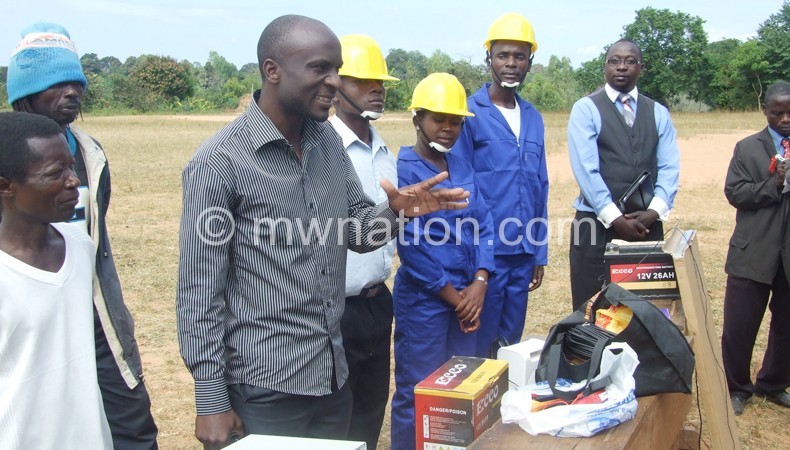Nkhata Bay’s solar dream comes true
Chilala is not your ordinary primary school. Travelling on the Lakeshore Corridor at night, it is easy to miss the Nkhata Bay rural school whose proposed solar energy academy won the first prize in the United Arab Emirates’ (UAE) K40 million (US$96 386) Zayed Future Energy Prize four months ago.
The school is located in a remote area where residents remain human faces of latest census findings that one out of 100 rural dwellers is connected to the national electricity grid.

But at Chilala, a vernacular term for ‘draught’, nearly 600 learners seldom hunger for fruits since the hilly school is surrounded by fruit trees such as bananas, guavas, oranges and mangoes. Pupils call their self-sustaining agriculture permaculture, an environment-friendly agricultural system government rolled out in 40 schools in 2006.
For the community, the trees are more than just about children having access to a shade when the sun is at its sweltering high, a bite when they are hungry or handy examples of what to do when it comes to environmental conservation lessons.
It is the genesis of Zayed Solar Academy being constructed with a $100 000 grant from the UAE’s annual award which celebrates achievement, innovation, impact and sustainability in the renewable energy sector.
“The academy is up and running!” says co-pioneer, former head teacher Gilbert Kaunda, with 29 students completing the fourth week of solar energy generation lessons on July 25 when Sub-Traditional Authority (sub-T/A)Malaza commissioned the construction underway.
The emerging Zayed Energy and Ecology Centre, the fulfilment of their dream, is a monument of how the remote local education authority in sub-T/A Malaza defied the odds to win a multimillion kwacha prize in honour of the vision of UEA’s founding father, Sheikh Zayed Bin Sultan Al Nahyan.
Praising the Nkhata Bay school authority’s commitment to renewable energy at the Abu Dhabi Sustainability Week, Zayed Future Awards director general Dr Sultan Ahmed Al Jaber aptly stated: “Energy access is a pathway to economic and social opportunities,”
The solar academy represents the desired pathway and centre manager Kaunda remembered how it all began: “In 2006, government rolled out permaculture in 40 schools and we were named the best performer four years later.
“The rating saw me being the only head teacher invited to attend the International Permaculture Conference in Lilongwe where numerous visitors from overseas were inspired to visit the school.”
Among the visitors, US environmental conservation consultant Gail Swithenbank spent six weeks in the community and encountered tales of poverty which persuaded her to introduce a scholarship programme for 16 students and pays high school fees for six primary school leavers dedicated to permaculture and renewable energy.
“The Chilala scholarship programme was established to award learners school fees, but the facilities at Maula and Sanga community day secondary school, were greatly lacking. Basically, there were empty classrooms with few desks, no books, no electricity, no library and no science facilities,” recalls Swithenbank.
The scholarship quickly met a new challenge—higher education was a step too far for the beneficiaries.
To close the gap, the American urged the school to enter the life-changing competition in which the pride of Nkhata Bay triumphed over their fellow finalist from Somalia.
“Things began moving at lightning speed. I met traditional leaders and school committee members. In no time, we identified a 2.5 hectare site for the learning centre,” says Kaunda, one of the three locals that flew to the UAE when the humble school was named the first prize winner.
In their mind, the brains behind it envisage the learning centre becoming a model of renewable energy—especially solar lights, pumps and other equipment that will save the locals from relying on candles and paraffin lamps which can be risky, expensive and hazardous to the environment.
The centre’s design also includes an e-learning centre, a library, science labs as well facilities for teaching basic rural technologies.
“Looking forward, I see the learners becoming community engineers with the capacity to handle design, installations and troubleshooting of basic solar systems,” says Chrispin Gogoda, a lecturer in Mzuzu University’s department of renewable energy, who has been working with the 28 students in a dimly lit shelter so far.
Most rooftops in the area are dotted with solar panels imported from South Africa, where many go to work, but Gogoda says most of them are poorly installed, giving onlookers the impression that solar is inefficient and not worth adopting.
Apart from closing this gap, the solar academy will also supplement Technical, Entrepreneurial and Vocational Education and Training Authority’s (Teveta) role to reduce unemployment by equipping rural Malawians with relevant skills.
At the groundbreaking ceremony, Teveta executive director Wilson Makuliza Nkhoma said: “In addition to Teveta classes in bricklaying, carpentry and welding, we will ultilise the construction of the centre for on-the-job training.
“While putting the place in shape for solar energy intakes, we will engage the youth who will acquire necessary skills from site clearing, laying foundation, bricklaying, carpentry, fitting frames, doors and windows as well as roofing.”
According to Nkhoma, Teveta has been employing the on-the-job informal sector trainings on government projects—like construction of schools and hospitals—but they tend to take up to five people each.
In Malaza, 133 applied for the ongoing six-week course, but only 19 were picked.
With the academy taking shape, Swithenbank says: “I am looking forward to many more students getting skills and jobs, becoming self-reliant, ensuring all homes have power to allow pupils to study under safer lighting than candles and paraffin lamps.”





